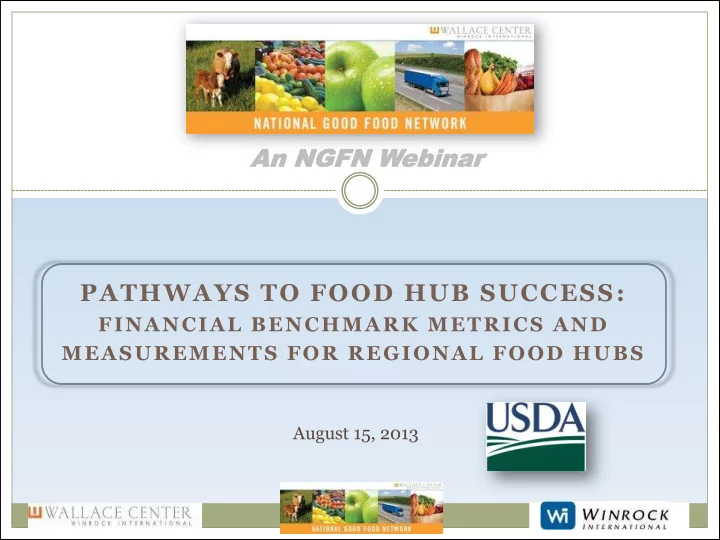

An NGFN W An NGFN Webina binar PATHWAYS TO FOOD HUB SUCCESS: FINANCIAL BENCHMARK METRICS AND MEASUREMENTS FOR REGIONAL FOOD HUBS August 15, 2013
Presentation Outline Technical Orientation Introduction Jeff Farbman Wallace Center at Winrock International Food Hub Benchmarking Description and Motivation Methods Data and Analysis Questions and Answers Upcoming Opportunities, etc.
W ALLACE C ENTER AT W INROCK I NTERNATIONAL • Market based solutions to a 21 st Century food system • Work with multiple sectors – business, philanthropy, government • Healthy, Green, Affordable, Fair Food • Scaling up Good Food
NATIONAL GOOD FOOD NETWORK: VISION
NATIONAL GOOD FOOD NETWORK: GOALS Supply Meets Demand • There is abundant good food (healthy, green, fair and affordable) to meet demands at the regional level. Information Hub • The National Good Food Network (NGFN) is the go to place for regional food systems stories, methods and outcomes. Policy Change • Policy makers are informed by the results and outcomes of the NGFN and have enacted laws or regulation which further the Network goals. http://ngfn.org | contact@ngfn.org
Presentation Outline Technical Orientation Introduction Food Hub Benchmarking Description and Motivation Gary Matteson – Farm Credit Council Methods Chad Gerencer – Morse Marketing Connections, LLC Data and Analysis Erin Pirro – Farm Credit East Questions and Answers Upcoming Opportunities, etc.
FOOD HUB BENCHMARKS A Collaboration of and
WHAT IS A “REGIONAL FOOD HUB”? “A business or organization that actively manages the aggregation , distribution , and marketing of source-identified food products primarily from local and regional producers for the purpose of strengthening producer capacity and access to wholesale, retail, and institutional markets .” USDA/NGFN Food Hub Collaboration Working Definition .
WHY FOOD HUBS? Fill a critical gap in regional food systems Positive impacts in their communities Variations on a theme: Farm to business Farm to consumer Hybrid model
WHY BENCHMARKS? Benchmark projects in other segments of agriculture Dairy Farms Retail Agriculture CSAs Wineries Greenhouses Lack of data on local food systems Need to understand the trends! local food purchasing, building regional food systems
WHAT’S A BENCHMARK? Collection of historical financial results and operational information from similar food hub businesses Comparison to peer group Analysis of information to identify range of performance
GOALS OF BENCHMARKING Identify descriptive metrics of value in assessing performance Recognize different models for food hubs Compare food hub performance across business models Provide snapshot of sector from a financial standpoint Resource for improving profitability, thus sustainability Visualize capacity of sector
METHODOLOGY OF THE STUDY Food hubs volunteered to participate Confidentiality of the utmost importance Good Records, Data questions via survey Reviewed complete financials to ensure reconciled, accrual earnings In/Out? Actually distributing food, not just renting space Lack of detail or ability to provide financials
WHAT GOES INTO A BENCHMARK? Good financial records Operational information Production measures Safety ratings Human resources practices Input from member businesses
DATA COLLECTION Confidential collection and analysis 2012 Data First financial study of Food Hubs Diverse product mix Due to the limited sample size, this study reflects only the general performance level of the peer group, not the entire food hub sector.
THANK YOU AGAIN, PARTICIPANTS The study and its ultimate findings rely on the volunteer participation of our member food hubs.
SCOPE OF OPERATIONS Average Age of Food Hubs: 11 Years Average Revenue: $1.65 million Annual Operations: 301 Days Facilities: Square Footage 9,018 Number of Loading Docks 2 Delivery Fleet (annual miles driven) 54,001
THE PRODUCT Sourcing Distance (miles) 521 Strictly Organic 20% Grow Some of Own Product 27% Buy From Own Incubator Farmers 33%
ORGANIZATION AND OPERATION “Not for Profit” status 53% Take ownership of product 73% Sales from in-house processing <1% Sales from value-added products 4% Membership Fees Charged To Vendors – 13% To Customers – 20%
SOURCES OF REVENUE
FINANCIAL POSITION Net Worth 57% Current Ratio 1.6:1 Blended Debt Term 14 years Blended Effective Interest Rate 1%
WHAT’S EVERYONE DOING? Employee Role FTE* Production/Growing 0.5 Sales 0.9 Delivery/Distribution 2.1 Management 0.7 Office/IT 0.8 Marketing 0.2 T otal 5.2 *paid equivalents Number of W-2s issued 10
FOOD HUB CUSTOMERS Type of Customer % of Sales Grocery/Food Stores 43.25% Restaurants and Caterers 21.52% Other Distributors 18.81% Direct Retail 6.13% Institutions (school, hospital, government) 4.51% Processors 3.74% Other 2.04% T otal 100.00%
CONCENTRATION - CUSTOMERS Average Number of Customers 326 Product Sales to Largest Customer 19% Product Sales to Largest 10 Customers 64%
CONCENTRATION - VENDORS Average Number of Vendors 79 Farmer Vendors 57% Food Safety Certification Required 33% Purchases with Largest Vendor 16% Purchases with 10 Largest Vendors 50%
BENCHMARK PROFIT & LOSS Revenue 100.00% - Cost of Goods - 67.63% - Cost of Sales - 11.04% Gross Margin 21.33% - Overhead Costs - 24.29% Net Margin (2.99%)
OPERATIONAL EFFICIENCY Markup Multiple 1.24 Gross Margin 21.3% Labor Costs as a Percent of Sales 17.4% Labor Costs per Paid FTE $48,867 Sales per Worker Equivalent $286,788
BUDGET FOR PROFITABILITY Set a profit goal + Overhead expenses Gross Margin $ Needed ÷ Gross Margin as a Percent of Sales Sales Needed Now you have the basis for a marketing plan.
QUESTIONS?
Questions and Answers Gary Matteson Farm Credit Council matteson@fccouncil.com Erin Pirro Farm Credit East Erin.Pirro@farmcrediteast.com Chad Gerencer Morse Marketing Connections Chad.j.gerencer@gmail.com Jeff Farbman Wallace Center at Winrock International contact@ngfn.org
Presentation Outline Technical Orientation Introduction Food Hub Benchmarking Description and Motivation Methods Data and Analysis Questions and Answers Upcoming Opportunities, etc.
Webinars are Archived TOPICS! http://ngfn.org/webinars
NGFN Webinars 3 rd Thursday of each month 3:30p EST (12:30p PST) http://ngfn.org/webinars Sept 19 – State of the Food Hub - National Survey Results Oct 17 - Food Hubs and Farm to School
Two Notable Websites www.FoodHub.info Food Hub “hub” Research, case studies, list and map of hubs across the country, much more. www.FoodshedGuide.org Case study-based business and financial training Includes a “One Page Business Plan” and a “One Page Financial Plan”
Get Connected, Stay Connected
http://ngfn.org contact@ngfn.org
Recommend
More recommend